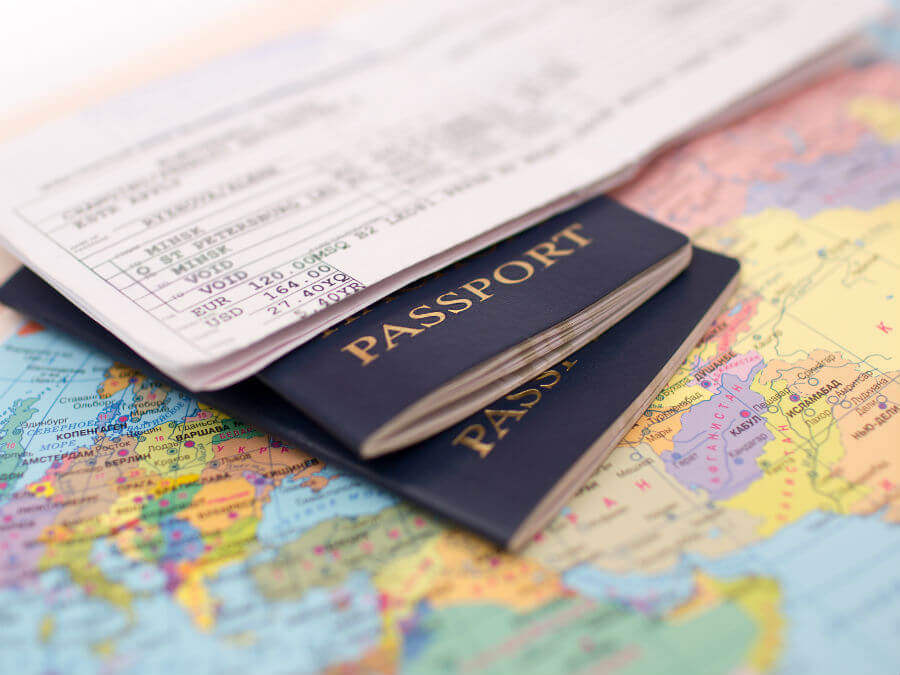
Passport pitfalls
No matter how much travelling you’ve done, little things can still catch you out. Forward planning can ensure little things don’t turn into big problems. Here are some of our top tips to keep you on schedule for a great holiday.
Pre-holiday passport checklist
- Check your passports are valid and have at least 6 months from the date you want to enter the country you’re travelling to. Check with the embassy or diplomatic office of the countries you are visiting to make sure you meet all of their entry requirements and if you need visas for entering.
- Check you have enough empty visa pages. Everyone loves collecting entry stamps and if you’re a frequent flyer your pages might be full. If your passport doesn’t have at least 1 empty visa page or enough room for customs or border protection stamps you may be refused entry.
- Check your passport is not damaged. If your passport looks like it’s been tampered with because of water damage or ripped corners and edges, you may be refused entry. If your photo or the security chip is affected in any way or your passport is in bad condition you could be refused entry.
- Check your passport is politically correct. Make sure any previous entry stamps won’t cause you a problem. Some entry stamps may be politically flagged in the country you are visiting.
- Make sure you don’t have any unpaid fines. Your passport is checked as you leave the country and your name will be checked against information held by our government. These days your passport is like your electronic fingerprint so if there’s anything outstanding that would be flagged, you could be stopped from leaving the country.
- Am I covered for this? Our travel insurance is designed to cover the unexpected – it’s just one of the ways we keep our prices low. We don’t cover the circumstances above because they are avoidable and not unexpected. However, we do cover lost or stolen travel documents up to $1,000, so you can travel with the confidence that we can help if the unexpected happens.
For more information on passports and visas visit the official website www.passports.gov.au.
Keeping your passport safe on holiday
No matter what kind of traveller you are or what you will be doing day to day, there will be times you will need your passport during your holiday. Aside from border control, activities such as checking in to hotels, renting a car and even purchasing duty free goods may require you to carry your passport.
Be aware of your surroundings when travelling and transiting. You will want your passport to be easily accessible but make sure you don’t leave it lying around or visible in an open bag. Invest in a good travel wallet that closes properly and can carry all travel documents. Consider purchasing a money belt if you are travelling through areas known for pickpockets.
Hiking, diving and lazing by the beach, it’s unlikely you’ll need your passport, so keep it in a safe place out of view and preferably in a safe at your accommodation. If you are staying in dorms or backpacking, hire a locker for your passport and valuables.
What to do when you lose your passport
First things first: stay calm. Although extremely inconvenient, a lost passport can normally be replaced through fairly standard procedures. While it may cost you extra fees that you hadn’t necessarily budgeted for, staying level headed and pragmatic will aid you in resolving your situation faster.
If you have lost your passport due to theft or robbery, file a report with the local authorities such as police within 24 hours. Make sure you keep the written police report otherwise your claim may not be paid. You will also need the police report to support your new passport application. Ensure you obtain a police reference number to follow up on any progress.
You will need to get in touch with Australian authorities as soon as possible to have your passport cancelled so locate the nearest Australian Embassy. Once it’s cancelled it cannot be used for travel. To replace your passport you can apply for an emergency travel document or a replacement passport. Check this website for all the details.
The content of this article is general and provided for information purposes only. Southern Cross Travel Insurance (SCTI) doesn’t guarantee or warrant the accuracy, completeness or currency of any article.
This article may contain hyperlinks to other websites owned or operated by third parties, or references to third party products or services. SCTI isn’t responsible for, and makes no recommendation about, the content or accuracy of any third party website, or for the suitability or performance of any product or service. The inclusion of a link in this article doesn’t imply that SCTI endorses the website or third party product/service.





